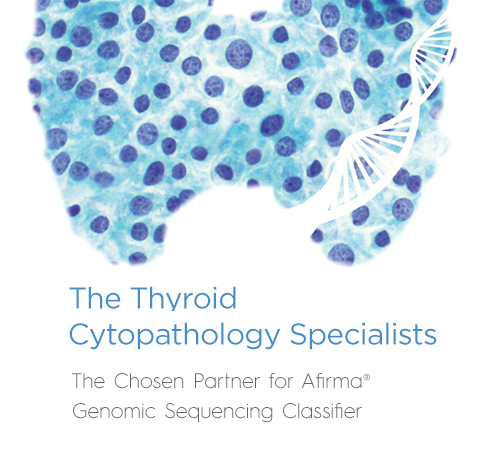

Thyroid-Specialized
Thyroid Cytopathology Partners (TCP) brings the kind of experience only gained from a high volume of cases, allowing clear and confident diagnoses.
Learn MoreQuality assurance
TCP adheres to a rigorous quality assurance program to facilitate clear, definitive and confident cytopathology diagnoses.
Learn MoreCustomer service
TCP pathologists are here to support you with rapid turn-around-times and availability by phone.
The Chosen Partner for Afirma Genomic Sequencing Classifier
TCP provides cytopathology review of cases submitted for the Afirma Genomic Sequencing Classifier. As members of the largest, thyroid-specialized cytopathology practice, TCP pathologists adhere to the established Bethesda criteria, which facilitate clear, definitive and confident cytopathology diagnoses.† For nodules diagnosed as indeterminate*, the Afirma Genomic Sequencing Classifier (GSC) is applied and can objectively reclassify these cases as either benign1 or suspicious for malignancy. And, when you receive an Afirma GSC Suspicious result or a Bethesda V or VI cytopathology result, adding the Afirma Xpression Atlas (XA) can provide additional genomic content to help inform surgery decisions and treatment options.
About Thyroid Cytopathology Partners
Located in Austin, Texas, TCP provides cytopathology services exclusively to Veracyte, Inc., the provider of the Afirma Genomic Sequencing Classifier. TCP pathologists are highly-trained, sub-specialized pathologists who collaborate and consult with each other on cases. The TCP team specializes in reviewing thyroid nodule FNAs, ensuring exposure to both common and rare thyroid lesions. Our diagnosis and detailed findings are integrated into the Afirma GSC+XA Paired patient report.
* Indeterminate (Bethesda III/IV) includes atypia of undetermined significance or follicular lesion of undetermined significance (AUS/FLUS) and follicular neoplasm or suspicious for a follicular neoplasm (FN/SFN).
1. Patel, JAMA Surgery 2018

